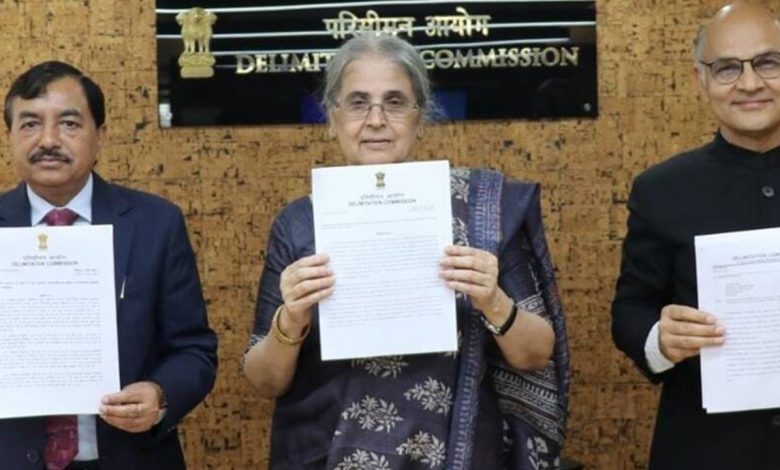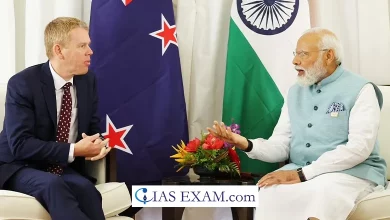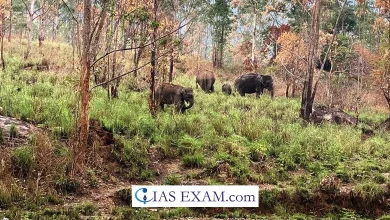Daily Current Affairs for UPSC
Delimitation commission in Jammu & Kashmir
Syllabus- Indian Constitution [GS Paper 2]

Context- The recommendations of Jammu and Kashmir delimitation commission were recently rejected by the Supreme Court.
Key Highlights-
- A petition that sought to challenge the Delimitation Commission’s redrawing of Jammu and Kashmir’s constituencies was recently rejected by the Supreme Court of India.
- Two Kashmiris, Haji Abdul Gani Khan and Muhammad Ayub Matto, submitted the petition.
- Following the 2019 bifurcation and downgrading of Jammu and Kashmir into two Union Territories, the government established the Delimitation Commission.
- Based on the 1971 Census, the petitioners argued that the country’s constituencies should not change until the first census after 2026.
- The government, on the other hand, stated that the Delimitation Commission was included in the Jammu and Kashmir Reorganisation Act, which was enacted in 2019 following the repeal of Article 370.
- The President had previously established a three-member Delimitation Commission, with Chief Election Commissioner Sushil Chandra and J&K State Election Commissioner K.K. Sharma served as ex-officio members and Justice (retired) Ranjana Prakash Desai as chair.
- The Commission has faced unique difficulties in completing the delimitation process, such as a variety of population densities, geographical obstacles, and insufficient conveniences at the international border.
The Delimitation Commission: What is it?
- The process of redrawing electoral boundaries to make sure that each constituency has roughly the same number of voters is known as delimitation. This is done to make sure that no one community has an unfair advantage in elections.
- Article 82 of the Indian Constitution contains a provision for a Delimitation Commission.
- After India’s first general elections in 1952, the first Delimitation Commission was established.
- Previously, all states and Union Territories were included in the delimitation exercises of 2002 and 2008, with the exception of Jammu and Kashmir, which was covered by a separate Delimitation Commission in 1995.
- A three-member Delimitation Commission for the Union Territory of Jammu and Kashmir was established in 2020, marking the most recent reconstitution of the commission.
Composition of the Delimitation Commission
- The President of India appoints the Delimitation Commission, a high-level body.
- A chairperson and four other members make up the Commission, all of whom are former or current Supreme Court or High Court judges.
- After consulting with the Speaker of the Lok Sabha and the Chairman of the Rajya Sabha, the President selects the members.
- A Director is in charge of the secretariat that supports the Delimitation Commission.
Important aspects
- The Delimitation Commission is in charge of redrawing the boundaries of the Lok Sabha and Vidhan Sabha constituencies.
- Geography, topography, and the boundaries of administrative units like districts and tehsils are all taken into consideration by the Commission.
- Additionally, the Commission ensures that the interests of Scheduled Castes and Scheduled Tribes in each constituency are protected by taking into consideration their number.
- The number of seats in a state or Union Territory can be increased or decreased by it.
- After each census, the delimitation process is done to make sure that the electoral boundaries reflect the changing demographics of the country.
Key Recommendations
- The Delimitation Commission’s recommendations for J&K The new Assembly would have 90 seats, with 43 in Jammu and 47 in Kashmir. This is an increase from the previous 83 seats, which had six seats in Jammu and one in Kashmir.
- Nine seats have been reserved for Scheduled Tribes for the first time in J&K, six in Jammu, three in the Kashmir Valley, and seven for Scheduled Castes.
- At least two “Kashmiri migrants” should be named by the Centre to the Legislature, where they would have the same authority as members of the Puducherry Assembly.
- The Centre will decide whether or not to provide “some representation” to people who have been displaced from Pakistan-occupied J&K.
- The Anantnag region in the Valley and Rajouri and Poonch in the Jammu region have been combined by the Commission into a single Lok Sabha constituency. Regional parties have criticized this move because there is no direct access between the two areas during the winter.
- A few Assembly segments in the Kashmir division that had been renamed in the previous draft and drew criticism from local parties have been renamed and restored by the Commission.
- For the purposes of the delimitation, the Delimitation Commission considered Jammu and Kashmir to be a single entity. As a result, each Parliamentary constituency will now have an equal number of 18 Assembly constituencies.
Way Ahead
- The Delimitation Commission is a significant organization responsible for ensuring that India’s electoral boundaries are equitable and fair.
- It has opened the door to the first-ever Assembly elections in the Union Territory of Jammu and Kashmir with the notification of recommendations.
- Even though regional parties have criticized some of the Commission’s decisions, the delimitation process aims to ensure that all members of the population are equally represented in elections, which is an essential component of democracy.





.png)



